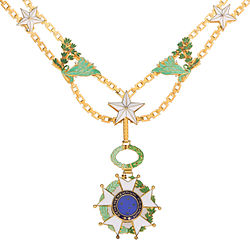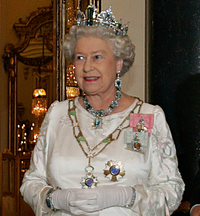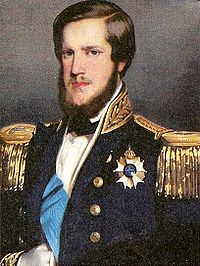- Order of the Southern Cross
-
National Order of the Southern Cross 
Grand Collar of the National Order of the Southern Cross Awarded by the Government of Brazil Type Order Motto Benemerentium Premium[1] Eligibility Foreign nationals[2] Awarded for "As a token of gratitude and recognition for those who have rendered significant service to the Brazilian nation."[2] Status Currently awarded Grand Master His Excellency the President of Brazil[3] Chancellor His Excellency the Minister of Foreign Affairs[3] Grades (w/ post-nominals) Grand Collar[4]
Grand Cross[4]
Grand Officer[4]
Commander[4]
Officer[4]
Knight[4]Established 1822-1891 (imperial order)
1932- (current order)First induction December 1, 1822[5] 
Ribbon bar of the National Order of the Southern Cross The National Order of the Southern Cross (Portuguese: Ordem Nacional do Cruzeiro do Sul) is a Brazilian order of chivalry founded by Emperor Pedro I on 1 December 1822. This order was intended to commemorate the independence of Brazil and the coronation of Pedro I.[6] The name derives from the geographical position of the country, under the constellation of the Southern Cross and also in memory of the name - Terra de Santa Cruz - given to Brazil at the time of its discovery.[5]
Contents
History
Originally known as the Imperial Order of the Southern Cross (Ordem Imperial do Cruzeiro do Sul), the Order was erected by Emperor Pedro I on the very day of his Coronation, on 1 December 1822. Also on the same date the first knights of the order were appointed, to commemorate the crowning of the Empire's first monarch. Since the proclamation of the independence of Brazil on 7 September 1822 other honorific awards had been made, but of the Orders of chivalry shared with Portugal, Brazilian branches of which had been created upon independence; the Order of the Southern Cross, created to mark the Coronation of the Empire's founder, was thus also the first purely Brazilian Order.
It was suppressed after the proclamation of the Republic in Brazil by a provision of the Constitution of February 24, 1891 that abolished all titles of nobility and all Imperial Orders and decorations.[5] It was later re-established by the government of Getúlio Vargas on December 5, 1932, as the National Order of the Southern Cross.[5]
During the period of Brazilian History known as the Old Republic, that lasted from the Proclamation of the Republic until the Revolution of 1930, no National Orders existed and the Brazilian State bestowed no decorations apart from military medals[7]. Created in 1932, the National Order of the Southern Cross was the first Order to be created in the re-established, republican honours system. It is thus considered the senior one among the Brazilian National Orders.
In the Imperial period, however, the Order of the Southern Cross was not the highest ranking of the Imperial Orders, as it ranked below the Brazilian branches of the ancient orders of chivarly, inherited from Portugal: the Order of Christ (the senior-most Order), the Order of Saint Benedict of Aviz and the Order of St. James of the Sword. Those Orders were shared by Brazil with Portugal, and, in the case of the Order of Christ, also with the Holy See, just like there is an Austrian and a Spanish Order of the Golden Fleece. However among the purely Brazilian Orders, the Imperial Order of the Southern Cross ranked first, having higher status than the Imperial Order of Pedro I and the Imperial Order of the Rose.
Pedro II of Brazil with the Imperial Order of the Southern Cross
The Imperial version of the Order of the Southern Cross continues to be used by both branches of the Brazilian Imperial Family as a House Order, awarded by the rival claimants to the position of Head of the Imperial Family, but such awards are not recognized by the Laws of the Republic.
Just like the Emperors of Brazil were ex officio Grand Masters of the Imperial Order, Presidents of Brazil are ex officio Grand Masters of the successor National Order. Accordingly, President Dilma Rousseff is the Order's current Grand Master.
Criteria
Unlike the Imperial Order, that was awarded to Brazilians and foreigners alike, the republican National Order is awarded to foreigners only. When the Order was re-created in 1932, it was intended as an Order to be awarded by the Government of Brazil as an act of external relations. That characteristic has been preserved since the re-establishment of the Order and thus its current regulations, approved by a Presidential Decree of 13 January 1971 [8] confirm that the Order is restricted to foreigners and that all awards of the Order constitute an act of foreign relations on the part of the Brazilian Government[9].
The original reason why the re-established National Order of the Southern Cross admits no Brazilians to its ranks is this: precisely because, in the Old Republic, the State regarded Orders and decorations as contrary to the principles of republicanism, and thus maintained no honours system, the creation of an Order that would also admit Brazilians to its ranks was seen as a step too far. However the Brazilian State also resented the lack of a decoration with which to honour foreign dinataries, as is sometimes almost required by diplomatic protocol. For instance, in the Old Republic, Brazilian authorities would often be presented with foreign decorations in certain occasions, but they could not reciprocate the courtsey by offering foreign authorities Brazilian decorations in similar occasions, because Brazil had no decorations. This lack of decorations to award to foreigners was felt in a particularly acute manner during the celebrations of the Centennial of Brazilian Independence in 1922. Several foreign dinataries, including the King and Queen of the Belgians and the British Prince of Wales came to Brazil for the celebrations, and the King of the Belgians bestowed Belgian honours to some Brazilians. In 1922 the mere wearing of decorations was against the republican praxis in Brazil, but the Government of the Republic, having authorized Brazilians to accept the foreign honours, relaxed its practice, and allowed the wearing of the foreign medals. The Brazilian Government lacked, however, any decorations with which to reciprocate the Belgian gesture. Thus, when it was created ten years later, in 1932, the National Order of the Southern Cross was intended as an Order that would fill that gap, by allowing the Brazilian Government to honour foreigners when appropriate. But at the time of its creation, the establishment of a Brazilian honours system for Brazilians was still considered a step too far. Only later the anti-titles mentality was further relaxed, and Orders to which Brazilians too could be admitted were instituted, the first of those being the National Order of Merit (Ordem Nacional do Mérito) created in 1946 during the administration of President Eurico Dutra.
On the other hand the decision by President Getúlio Vargas of basing the newly created National Order of the Southern Cross on the previous Imperial Order of the same name, and to indicate that the National Order is the successor of the Imperial Order by adopting an almost identical model for the insignia, etc., was intended as a way of increasing the prestige of the new Order, by linking it with the past, that is, by associating it with an Order that had been erected more than one century earlier, and that had been awarded to great Brazilians and foreigners alike.
Awards of, and promotions in, the National Order of the Southern Cross are made by decree of the President of the Republic, in his capacity as the Order's Grand Master. The decree of appointment or promotion is, like all presidential decrees, published in the Federal Government's Official Journal, and, as per the Order's regulations, the appointment or promotion is also recorded in a book kept by the Order's secretary.
The Brazilian Minister of Foreign Relations serves as the Chancellor of the Order, and an officer of the Ministry of Foreign Relations that heads the ceremonial and protocol division serves as the Secretary to the Order. The Order also has a Council, chaired by its Chancellor, that recommends awards and promotions.
Classes
Under its current regulations, the Order consists of the Grand Master and six Classes of members:[4]
- Grand Collar: the recipient wears the adorned "grand collar", a chain from which the badge of the order is suspended, and the recipient further displays the "star" of the order on the left breast. Awards of the Grand Collar are restricted to foreign Heads of State.
- Grand Cross: badge affixed to a light blue sash worn on the right shoulder, with the star of the order displayed on the left breast.
- Grand Officer: badge worn on the left breast suspended from a ribbon with a rosette, and the star of the order displayed on the right breast.
- Commander: badge of the order worn around the neck suspended from a ribbon necklet.
- Officer: the badge is worn on left breast suspended from a ribbon with a rosette.
- Knight: who wears the badge of the Order on the left breast suspended from a ribbon.
Ribbon bars Knight Officer
Officer Commander
Commander Grand Officer
Grand Officer Grand Cross
Grand Cross Grand Collar
Grand Collar
Notable recipients
 Queen Elizabeth II of the United Kingdom displays the "Grand Collar" and star of the National Order of the Southern Cross
Queen Elizabeth II of the United Kingdom displays the "Grand Collar" and star of the National Order of the Southern Cross
- 2011 -
 Georgi Parvanov (as President of Bulgaria)[10]
Georgi Parvanov (as President of Bulgaria)[10] - 2006 -
 Jacques Diouf (as diplomat)[11]
Jacques Diouf (as diplomat)[11] - 2003 -
 Ann Hartness (as scholar)[12]
Ann Hartness (as scholar)[12] - 1968 -
 Elizabeth II (as Queen of the United Kingdom and of the other Commonwealth Realms)
Elizabeth II (as Queen of the United Kingdom and of the other Commonwealth Realms) - 1963 -
 Josip Broz Tito (as President of Yugoslavia)
Josip Broz Tito (as President of Yugoslavia) - 1961 -
 Che Guevara (as revolutionary)[13]
Che Guevara (as revolutionary)[13] - 1944 -
 Douglas Fairbanks Jr. (as naval officer)
Douglas Fairbanks Jr. (as naval officer) - 1940 -
 Robert B. Williams (as pilot)[14]
Robert B. Williams (as pilot)[14] - 1935 -
 Jean Batten (as aviatrix)[15]
Jean Batten (as aviatrix)[15]
References
- ^ Ordem Nacional do Cruzeiro do Sul Banco Central do Brasil. Retrieved on 2010-10-10. (Portuguese).
- ^ a b National Order of the Southern Cross Medal-Medaille. Retrieved on 2010-10-10.
- ^ a b Condecorações: Cruizeiro do Sul - Conselho Ministério das Relações Exteriores. Retrieved on 2010-10-10. (Portuguese).
- ^ a b c d e f g Condecorações: Cruizeiro do Sul - Regulamento Ministério das Relações Exteriores. Retrieved on 2010-10-10. (Portuguese).
- ^ a b c d Condecorações: Cruizeiro do Sul - Histórico Ministério das Relações Exteriores. Retrieved on 2010-10-10. (Portuguese).
- ^ White, William. Notes and queries, Volume 78. London: 1888, p. 173.
- ^ Even the republican Ordem de Colombo (Order of Columbus) that had been established by the Provisional Government of the Republic as a replacement to the Imperial Orders, was considered abolished when the republican Constitution of 1891 was passed, given that it prohibited National Orders altogeter. Only after that Constitution was no longer in force National Orders were established, beginning with the National Order of the Southern Cross
- ^ http://www6.senado.gov.br/legislacao/ListaNormas.action?numero=68055&tipo_norma=DEC&data=19710113&link=s
- ^ http://www2.mre.gov.br/Cerimonial/CruzeirodoSul/Home-CS.htm
- ^ Presidente Dilma é condecorada com a mais alta ordem da Bulgária GazetaOnline. Retrieved on 2011-10-05. (Portuguese).
- ^ "Dr Jacques Diouf, Director-General Food and Agriculture Organization of the United Nations (FAO)". FAO website. Food and Agriculture Organization of the United Nations (FAO). July, 2007. http://www.fao.org/english/dg/dioufcv.htm. Retrieved 2009-09-26.
- ^ "Ann Hartness to receive Brazil's National Order of the Southern Cross". News releases. Nettie Lee Benson Latin American Collection, University of Texas. April 10, 2003. http://www.lib.utexas.edu/about/news/hartness3.html. Retrieved 2009-09-26.
- ^ "Janio condecora Guevara". Folha de S. Paulo. 20 August 1961. http://almanaque.folha.uol.com.br/brasil_20ago1961.htm. Retrieved 2010-08-24.
- ^ "Major General Robert B. Williams". U.S. Air Force Official Website. U.S. Air Force. http://www.af.mil/information/bios/bio.asp?bioID=10618. Retrieved 2010-03-31.
- ^ My Life, by Jean Batten, George G. Harrap & Co. Ltd., 1938
External links
- Orden Nacional do Cruzeiro do Sul - official website of the Brazilian Ministry of External Relations (Portuguese)
- Orders and Decorations of all Nations by Robert Werlich and Jose Luiz Silva Preiss-Porto Alegre-RS-Brazil
Categories:- Orders, decorations, and medals of Brazil
- Order of the Southern Cross
Wikimedia Foundation. 2010.

